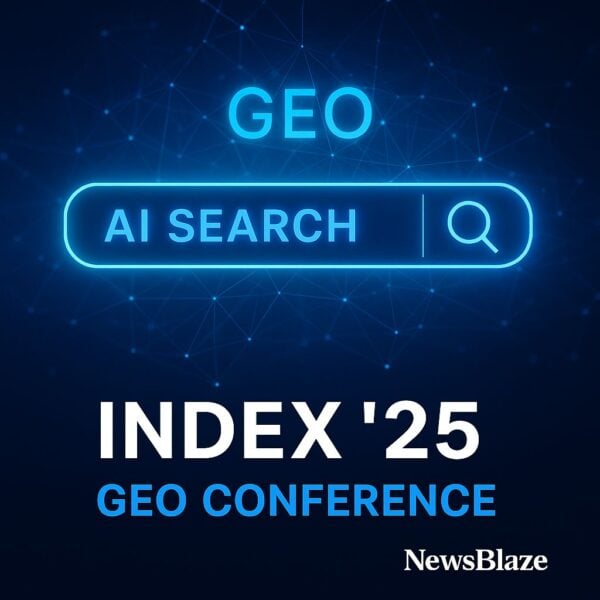World’s First Ai-search Conference Opens October 1
A new chapter in digital marketing begins on October 1, when Index’25 opens its virtual doors to more than 1,000 global marketing leaders. The event, billed as the world’s first AI-Search Conference, will run across more than 25 sessions and focus on Generative Engine Optimization (GEO) — a new discipline that is rapidly reshaping how brands are discovered.
For years, the search marketing playbook was built on SEO. Keywords, backlinks and ranking strategies defined how businesses reached their audiences. Today, the rise of generative AI is forcing CMOs and marketing executives to rethink visibility in an era where AI-powered assistants provide answers instead of search results pages.
Index’25, organized by Pepper Content, is designed to help leaders bridge this divide. The conference positions GEO as the next frontier — and those who adapt quickly stand to capture a major competitive edge.
Pepper Content Steps Into The Spotlight
The driving force behind Index’25 is Pepper Content, an AI-driven content marketing platform serving CMOs and marketing teams. Known for its blog writing and content lifecycle management, Pepper has grown into a partner for enterprises navigating digital transformation.
By launching Index’25, Pepper Content is extending its role from service provider to industry convener. The company is making a statement: GEO is not a distant concept, it is the urgent reality of 2025.
Pepper’s invitation described the event as “designed for marketing leaders navigating the generational shift in search, where traditional SEO meets the AI-first era.”
High-profile Speaker Lineup
The Index’25 stage brings together an unusually diverse roster of speakers — from digital marketing pioneers to leaders in enterprise technology, consulting and consumer goods. Here are seven of the more than 25 speakers.
-
Neil Patel, co-founder of Neil Patel Digital, widely regarded as one of the most influential figures in online marketing.
-
Simon Mulcahy, former Salesforce CMO and ex-president of TIME, with deep experience at the intersection of technology and media.
-
Sydney Sloan, CMO of G2, bringing expertise in buyer reviews and peer-driven discovery.
-
Anand Swaminathan, senior partner at McKinsey, providing a strategy consulting perspective.
-
Meagen Eisenberg, CMO of Samsara, a voice for enterprise technology marketing.
-
Linda Caplinger, head of integrated search at NVIDIA, offering an AI hardware and software outlook.
-
Deepak Subramanian, president and MD of Unilever Food Solutions, representing global consumer brands.
Each of these leaders represents a unique angle on GEO, underscoring how far-reaching its impact will be.
Editor’s Note: Look for these 7 speaker stories coming up next.
Why Generative Engine Optimization Matters
Traditional SEO was built on a predictable model: search engines indexed web pages, and rankings were determined by signals like relevance, authority and technical optimization. Marketers could see results on a page and adjust accordingly.
Generative AI changes this dynamic. Instead of returning a list of links, AI-driven tools — from ChatGPT to Google’s AI Overviews and Microsoft Copilot — generate synthesized answers. The pathway between user and brand has been disrupted.
That means:
-
Less visibility for organic search results. Brands may no longer appear unless AI tools recognize and trust their content.
-
Greater emphasis on authority and credibility. AI assistants prioritize information from recognized, reliable sources.
-
Shift to structured data and machine-readable signals. Content must be optimized not just for humans, but for algorithms that decide what gets surfaced.
In short, GEO is SEO for the AI era. Without it, companies risk invisibility in the places their customers are now searching.
Impact on Cmos and Marketing Leaders
For CMOs, the rise of GEO brings both challenges and opportunities.
-
Measurement is harder. Instead of tracking clicks and rankings, leaders must assess how often AI assistants reference their brand.
-
Content strategy evolves. Long-tail keyword targeting gives way to structured, authoritative insights designed for AI training models.
-
Competition expands. Smaller companies can leapfrog incumbents if they adapt to GEO faster.
Speakers at Index’25 are expected to tackle these shifts directly, offering case studies and forward-looking strategies.
Global Context: Search in Flux
The timing of Index’25 could not be more relevant. In recent months:
-
Google’s AI Overviews began rolling out to users, sparking debate about declining organic visibility.
-
Microsoft Copilot deepened its integration into Bing and enterprise software.
-
OpenAI announced partnerships to bring generative answers into everyday applications.
For marketing leaders, these moves signal a structural change in how audiences discover brands, products and services.
Index’25 provides a forum for interpreting these changes — and for charting paths forward before GEO becomes standard practice.
Exclusive, Invite-only Format
Unlike open industry expos, Index’25 is invite-only, curated specifically for senior marketing executives and CMOs. This selective approach ensures focused discussions, not just broad promotion.
By keeping the event virtual, Pepper Content opens participation globally, while maintaining exclusivity and targeting decision-makers.
Continuing Index’25 Coverage
NewsBlaze will provide pre-event profiles of the keynote speakers, insights from their sessions, and a post-event wrap-up highlighting the key takeaways from Index’25.
For attendees, Index’25 represents a rare chance to hear directly from leaders shaping the future of search. For the broader industry, it marks the moment when GEO officially entered the marketing mainstream.

